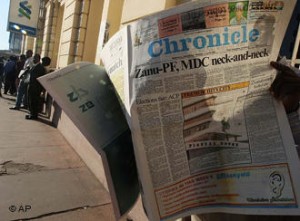Search Results for Tag: online journalism
Edit photos online with PicMonkey
 When Google closed its popular Picnik online photo editing service earlier this year, there must have been a collective internet cry of “No!”. For journalist trainees Picnik was a great way of introducing the basics of photo editing, and it was available in several languages. So, what can fill the gap? Enter PicMonkey. Oh and by the way, it’s easy to use and it’s free.
When Google closed its popular Picnik online photo editing service earlier this year, there must have been a collective internet cry of “No!”. For journalist trainees Picnik was a great way of introducing the basics of photo editing, and it was available in several languages. So, what can fill the gap? Enter PicMonkey. Oh and by the way, it’s easy to use and it’s free.
![]() read more
read more
Write the perfect headline!
Your choice of headline – whether for online or print media – can really make or break your story. No matter how exclusive your interview, or how fascinating your scoop – if your headline is boring or awkward you will have reduced the number of people who click on your article or turn to your story.
Not just for this reason, some reputable newspapers and news agencies around the world have their own headline specialists – experienced editors who focus on just drafting headlines. But if, like with most of us, you always have to write the headlines for your stories yourself, what are the things you should keep in mind?
![]() read more
read more
Turning attention to women’s rights in South Asia
 Spotlighting women’s issues in South Asia is the focus of a recently introduced multimedia project at Deutsche Welle. Three young female journalists from Pakistan, Afghanistan and India were sponsored by the Friedrich Ebert Foundation to help launch the undertaking in Bonn.
Spotlighting women’s issues in South Asia is the focus of a recently introduced multimedia project at Deutsche Welle. Three young female journalists from Pakistan, Afghanistan and India were sponsored by the Friedrich Ebert Foundation to help launch the undertaking in Bonn.
Their online dossiers feature reports in Hindi, Urdu, Dari and English on topics such as maternal mortality and healthcare, women’s rights and the role of women in business and society.
“Good journalism promotes positive changes in society,” says Ayesha Hasan of Pakistan, one of the visiting journalists who participated in the kick-off of the Women’s World project in late 2011. Reflecting on the role of free media, Hasan says they “can bring about peace within Pakistan as well as with its neighbors.”
![]() read more
read more
What makes a good blog post?
 Blogs make publishing literally anything online a breeze. And whether you’re a radio, TV, print or online journalist, a blog can offer a creative space to experiment, or a digital companion to your published or broadcast work – a sort of personal digital notebook – or, it can be whatever you want it to be.
Blogs make publishing literally anything online a breeze. And whether you’re a radio, TV, print or online journalist, a blog can offer a creative space to experiment, or a digital companion to your published or broadcast work – a sort of personal digital notebook – or, it can be whatever you want it to be.
Increasingly, many media outlets are using blogs in a more formal way – often giving journalists the freedom to explore a topic in more depth or take readers behind the scenes of their work.
But while technology makes blogging easy, starting out as a blogger and actually writing something worth reading can be a daunting task.
Blogging is a little bit like a digital writing adventure. And even though you might think someone is a good writer or a good journalist, that doesn’t necessarily mean they’ll instantly be a good blogger.
So, what follows here are a few tips to bear in mind for writing a good blog post.
![]() read more
read more
Live blogs reveal a huge appetite for information

Photo credit: Flickr/@afloden
![]() read more
read more
Taking first steps into multimedia with audio slideshows
For any journalist who has spent most of their career working only in one medium, be it in radio, print or photography, taking your first steps into multimedia can be exciting but also a little daunting.
One of the tools that many journalists in our workshops get really excited about is Soundslides. It's a programme that produces audio slideshows by combining photos and audio. For radio and print journalists it's a new way to add images to their storytelling, and for photo journalists to add narration and sound to their photos. Plus it’s affordable and very easy to use.
![]() read more
read more








Feedback